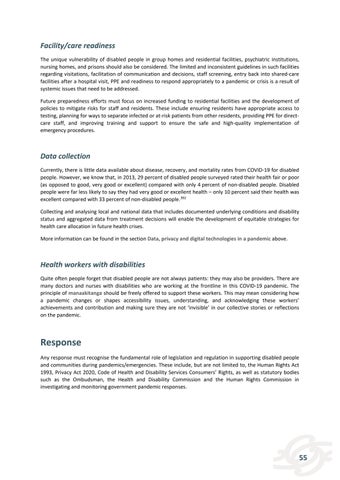Facility/care readiness The unique vulnerability of disabled people in group homes and residential facilities, psychiatric institutions, nursing homes, and prisons should also be considered. The limited and inconsistent guidelines in such facilities regarding visitations, facilitation of communication and decisions, staff screening, entry back into shared-care facilities after a hospital visit, PPE and readiness to respond appropriately to a pandemic or crisis is a result of systemic issues that need to be addressed. Future preparedness efforts must focus on increased funding to residential facilities and the development of policies to mitigate risks for staff and residents. These include ensuring residents have appropriate access to testing, planning for ways to separate infected or at-risk patients from other residents, providing PPE for directcare staff, and improving training and support to ensure the safe and high-quality implementation of emergency procedures.
Data collection Currently, there is little data available about disease, recovery, and mortality rates from COVID-19 for disabled people. However, we know that, in 2013, 29 percent of disabled people surveyed rated their health fair or poor (as opposed to good, very good or excellent) compared with only 4 percent of non-disabled people. Disabled people were far less likely to say they had very good or excellent health – only 10 percent said their health was excellent compared with 33 percent of non-disabled people. 392 Collecting and analysing local and national data that includes documented underlying conditions and disability status and aggregated data from treatment decisions will enable the development of equitable strategies for health care allocation in future health crises. More information can be found in the section Data, privacy and digital technologies in a pandemic above.
Health workers with disabilities Quite often people forget that disabled people are not always patients: they may also be providers. There are many doctors and nurses with disabilities who are working at the frontline in this COVID-19 pandemic. The principle of manaakitanga should be freely offered to support these workers. This may mean considering how a pandemic changes or shapes accessibility issues, understanding, and acknowledging these workers’ achievements and contribution and making sure they are not ‘invisible’ in our collective stories or reflections on the pandemic.
Response Any response must recognise the fundamental role of legislation and regulation in supporting disabled people and communities during pandemics/emergencies. These include, but are not limited to, the Human Rights Act 1993, Privacy Act 2020, Code of Health and Disability Services Consumers’ Rights, as well as statutory bodies such as the Ombudsman, the Health and Disability Commission and the Human Rights Commission in investigating and monitoring government pandemic responses.
55


